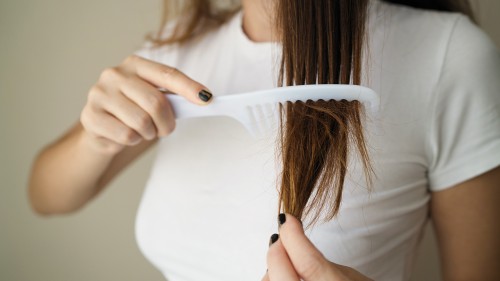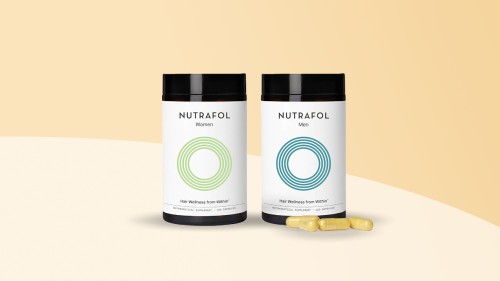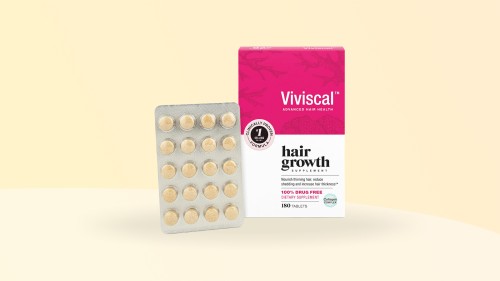7 Diet Mistakes That May Be Leading to Hair Loss
Published on March 21, 2022
Medically Reviewed by Natalie Olsen, MS, RDN
The body requires adequate vitamins and minerals to support optimal hair growth. If you suddenly find yourself with more than usual hair loss, here are a few dietary factors to consider.


While hair loss is most often associated with age, genetics, and gender, poor nutrition can substantially contribute to the problem.
Our body requires sufficient vitamins and minerals to support optimal hair growth.
Hair growth will slow when nutrients are lacking to preserve energy for more critical bodily functions.
If you are currently dealing with brittle and damaged hair or more than usual hair loss, you might be wondering if your diet is to blame.
Let's look at several diet factors that may be affecting your hair health.
1. Low Fruit and Vegetable Intake
According to a 2019 report from the CDC, only about 10% of adults meet the recommendation for fruit and vegetable intake. (1)
A diet lacking in fruit and vegetables is a good indicator that you may be missing out on several essential nutrients.
Eating a variety of fruits and vegetables helps to ensure you are meeting your needs for vitamins, minerals, and antioxidants such as:
- Vitamin A
- Vitamin B — thiamine (B1), riboflavin (B2), niacin (B3), pantothenic acid (B5), pyridoxine (B6), biotin (B7), folate (B9), cobalamin (B12)
- Vitamin C
- Vitamin E
- Vitamin K
- Selenium
- Zinc
- Vitamin D — an important nutrient that primarily comes from the sun
Studies have reported that nutrient deficiency may impact hair structure and hair growth. Researchers have also found a possible link between nutritional deficiencies and male and female pattern baldness. (2)
Furthermore, missing out on fruits and vegetables limits your intake of powerful antioxidants.
Antioxidants play a protective role in the body, helping to diminish the effects of stress and free radical damage.
Antioxidants may also play a role in protecting from hair loss. Studies have found excess free radical damage in the scalp of patients with balding. (3)
While antioxidants and nutrients play a role in hair health, the role of supplementation requires further research.
Without the oversight of a physician, supplementation may lead to toxicity of some nutrients, actually making hair loss worse.
Ensuring a well-rounded diet with an adequate intake of fruit and vegetables is the preferred method for warding off nutrient deficiency hair loss.
Summary
Eating insufficient amounts of fruits and vegetables may leave you missing out on essential vitamins, minerals, and antioxidants for healthy hair growth.
Poor nutrition status can be a culprit of unwanted hair loss.
Supplementation does not take the place of a healthy diet, and excess supplementation may lead to worsening hair loss.
2. The Vegan Diet
Transitioning to a vegan diet without a proper plan in place can leave you shedding more hair than you'd like.
Vegans and vegetarians are at a higher risk for iron deficiency. Their requirements for dietary iron are about 1.8 times higher than individuals who consume meat. (2)
Evidence suggests that iron deficiency may be related to hair loss. (4)
In addition to iron, vegans may be at risk for zinc deficiency. Unfortunately, the bioavailability of zinc is less available in vegetables than meat. (2)
Legumes and whole grains, which often comprise a large portion of the vegan diet, contain phytates. These compounds bind to zinc, which may inhibit optimal absorption. (2)
Furthermore, because going vegan means cutting out all meat and animal byproducts, it may mean missing out on adequate protein.
In the case of protein malnutrition, the body will attempt to save protein stores by slowing hair growth and shifting it into the resting phase. (5)
This shift in the hair cycle may lead to increased hair shedding in the following months. (5)
Finally, it is not to say that a vegan diet will always lead to hair loss.
However, these possible nutrient deficiencies are essential to keep in mind if you recently shifted to a vegan diet and find your hair thinning or suddenly falling out.
Summary
A vegan diet is not the problem. However, going into one without a plan may lead to nutritional deficiencies. These deficiencies may slow hair growth and lead to unwanted shedding of hair.
3. Extreme Calorie Restriction
Dramatically restricting your calorie intake often means you are not ingesting adequate amounts of essential vitamins, minerals, and nutrients (such as protein and fat).
Like a poorly-balanced vegan diet, severe calorie restriction may lead to unwanted hair loss.
Deficiencies in essential nutrients, especially if maintained over time, can lead to a type of hair loss called telogen effluvium. (5)
This type of hair loss is triggered by stress, and crash diets are a quick way to throw the body into a state of stress.
The good news is this hair loss is typically reversible once a healthier diet and less restricted eating patterns are adopted.
Summary
Dramatically cutting calories, as in a crash diet, can be incredibly stressful on the body. Telogen effluvium is a type of hair loss commonly triggered by stress.
Ensuring a healthy, non-restrictive eating pattern can help to reverse this type of hair loss.
4. High Sugar Carbohydrates
Sugar seems to be a common culprit in most health conditions.
Unfortunately, not only is it addictive, it is everywhere. If you consume a diet high in packaged foods, you are most likely consuming many hidden sugars.
Over time, repeated exposure to excess sugar may start to impact your blood vessels, causing them to narrow. (6)
As a result, the heart has difficulty pumping blood throughout the body, leading to poor circulation.
It becomes difficult for blood to efficiently reach your hair follicles with poor blood circulation, resulting in fewer nutrients being delivered to your hair. (7)
Additionally, excess sugar may contribute to a condition called "scalp inflammation."
This condition leaves your scalp feeling itchy, flakey, and uncomfortable. Unfortunately, this inflammation can damage the hair follicles, leading to hair loss. (8)
Finally, sugar blocks our body's ability to defend us from stress efficiently.
Too much sugar can raise our stress hormones, such as cortisol, adding additional stress to the body. (9)
A high sugar diet may worsen the problem of stress-induced hair loss. (5)
Summary
While sugar may taste sweet, it is not so kind to our bodies. A diet high in sugar may increase hair loss due to poor circulation and added stress on the body.
5. Excess Alcohol
While it may feel like a glass of wine is the right cure for a difficult day, daily drinking may add more stress to your body in the long run.
Data from a national survey of U.S. adults found that excessive drinking increased by 21% during the pandemic. (10)
Chronic drinking leads to dehydration and inhibits the absorption of vital nutrients such as B vitamins and vitamins A, C, D, E, and K. (11)
Also, increased alcohol intake will deplete the body of minerals such as zinc, iron, and calcium. (11)
Deficient levels of these essential vitamins and minerals are associated with hair loss. (12)
Finally, drinking alcohol in excess dehydrates your hair, leaving you with brittle, damaged locks.
Summary
While a celebratory drink is not a reason for hair loss, excess consumption of alcohol may cause vitamin and mineral deficiencies that can lead to hair loss.
On the most basic level, excess alcohol dehydrates you, which may leave you with dry, damaged hair.
6. Mercury Toxicity
While fish is a fantastic source of protein and should be included in a well-balanced diet, too much high mercury fish can be toxic.
High Mercury Sources of Fish:
- Swordfish
- King Mackerel
- Tuna
- Chilean Sea Bass
Low Mercury Sources of Fish:
- Salmon
- Tilapia
- Trout
- Whitefish
- Pollock
If high mercury fish is a large part of your diet, it is necessary to consider the potential for mercury toxicity.
Mercury toxicity may lead to hair loss among symptoms such as fever, rash, dizziness, and headaches. (13)
Additionally, an overload of mercury in the body may begin to deplete other essential vitamins and minerals such as:
- Vitamin C
- Selenium
- Zinc
- Calcium
- Iron
Most notably, mercury impairs the ongoing production of collagen. (14)
Collagen is a critical component of the hair follicle and the skin surrounding the follicle. (15)
Such nutrient deficiencies from mercury toxicity may be a reason for related hair loss.
Finally, research indicates hair loss due to mercury toxicity is reversible. Diet changes, including the reduction of high-mercury seafood, are recommended. (16)
Summary
On occasion, enjoying mercury-rich seafood is not a reason for hair loss; however, eating it in excess may lead to mercury build-up and toxicity.
Mercury inhibits the absorption of many vitamins and minerals and, when left untreated, may lead to hair loss.
7. High Fat Diet
While fats such as omega-3 fatty acids are a healthy choice, a diet containing too many saturated fats may impact your hair health.
Sources of Omega-3 Fatty Acids:
- Salmon
- Sardines
- Olive oil
- Flaxseeds
- Chia Seeds
- Walnuts
Sources of Saturated Fats:
- Many store-bought baked goods
- Fatty cuts of meat
- Full-fat dairy, such as ice cream and sour cream
- Coconut oil
- Cured meats
- Cheese
Research has found that a high-fat diet may lead to excess inflammation, possibly depleting hair follicle stem cells. (17)
Hair follicle stem cells are responsible for renewing every hair follicle. When they are diminished, it affects the number of hair follicles, leading to thinning hair. (17)
The impact of saturated fat is an essential consideration for lowering the inflammatory response from the body, possibly leading to more hair loss.
Summary
While fats such as omega-3 fatty acids are essential for a healthy diet, too much saturated fat may impact hair health. Research has found a link between a high-fat diet and hair thinning.
To mitigate the effects of saturated fats, be sure to include a variety of omega-3 sources in your diet.
The Bottom Line
A healthy, well-balanced diet is an integral part of hair health.
If you find yourself suddenly losing more hair than usual, it might be helpful to consider your diet choices.
A few diet factors to consider are:
- Low fruit and vegetable intake
- A vegan diet
- Crash dieting
- Intake of high sugar carbohydrates
- Excess alcohol consumption
- Mercury toxicity
- High saturated fat intake
A positive note is hair loss related to these dietary factors may be reversible once a varied, non-restrictive, healthy diet is resumed.
At WellnessVerge, we only use reputable sources, including peer-reviewed medical journals and well-respected academic institutions.
- Adults Meeting Fruit and Vegetable Intake Recommendations — United States, 2019 | MMWR:
https://www.cdc.gov/mmwr/volumes/71/wr/mm7101a1.htm - Diet and hair loss: effects of nutrient deficiency and supplement use - PMC:
https://www.ncbi.nlm.nih.gov/pmc/articles/PMC5315033/ - Antioxidant enzymes and lipid peroxidation in the scalp of patients with alopecia areata:
https://www.jdsjournal.com/article/S0923-1811(02)00015-4/fulltext - JAAD: The diagnosis and treatment of iron deficiency and its potential relationship to hair loss:
https://www.jaad.org/article/S0190-9622(05)04745-6/fulltext - Telogen Effluvium: A Review - PMC:
https://www.ncbi.nlm.nih.gov/pmc/articles/PMC4606321/ - Vascular complications of diabetes: mechanisms of injury and protective factors - PMC:
https://www.ncbi.nlm.nih.gov/pmc/articles/PMC3546345/ - Nutrition of women with hair loss problem during the period of menopause - PMC:
https://www.ncbi.nlm.nih.gov/pmc/articles/PMC4828511/ - The Basic Science of Hair Biology: What Are the Causal Mechanisms for the Disordered Hair Follicle?:
https://www.sciencedirect.com/science/article/abs/pii/S0733863512000940?via%3Dihub - Blood Sugar & Other Hormones :: Diabetes Education Online:
https://dtc.ucsf.edu/types-of-diabetes/type2/understanding-type-2-diabetes/how-the-body-processes-sugar/blood-sugar-other-hormones/ - Alcohol consumption during the COVID-19 pandemic projected to cause more liver disease and deaths:
https://www.massgeneral.org/news/press-release/Alcohol-consumption-during-the-covid-19-pandemic-projected-to-cause-more-liver-disease-and-deaths#:~:text=Using%20data%20from%20a%20national,trends%20in%20all%20U.S.%20adults. - Alcohol and Nutrition - Alcohol Alert No. 22- 1993:
https://pubs.niaaa.nih.gov/publications/aa22.htm - Hair loss: Who gets and causes:
https://www.aad.org/public/diseases/hair-loss/causes/18-causes - Alopecia and Associated Toxic Agents: A Systematic Review - FullText - Skin Appendage Disorders 2018, Vol. 4, No. 4 - Karger Publishers:
https://www.karger.com/Article/Fulltext/485749 - (PDF) Mercury: The Quintessential Anti-Nutrient:
https://www.researchgate.net/publication/316450883_Mercury_The_Quintessential_Anti-Nutrient - Histology, Dermis - StatPearls - NCBI Bookshelf:
https://www.ncbi.nlm.nih.gov/books/NBK535346/ - Reversible alopecia associated with high blood mercury levels and early menopause: a report of two cases - PubMed:
https://pubmed.ncbi.nlm.nih.gov/30939539/ - Science Daily: Eating less fat may save your hair:
https://www.sciencedaily.com/releases/2021/09/210921125146.htm






